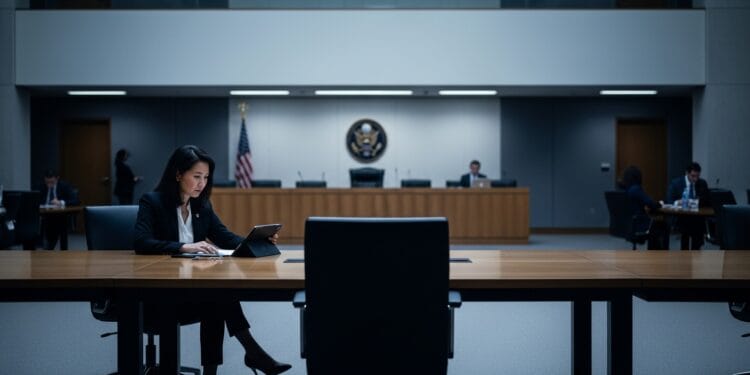Something rather peculiar is happening at the U.S. Commodity Futures Trading Commission, a place that usually hums with the steady rhythm of financial oversight. Next week, this vital agency, a key player in the crypto space, will shrink to a single commissioner. It’s a situation that raises more than a few eyebrows.
- The U.S. Commodity Futures Trading Commission (CFTC) is set to operate with a single commissioner, Acting Chairman Caroline Pham, after Commissioner Kristin Johnson’s departure.
- The confirmation of President Trump’s nominee, Brian Quintenz, is delayed, creating uncertainty about leadership continuity and the agency’s future direction.
- The CFTC, a key regulator for derivatives and increasingly for crypto, faces potential legal challenges to its policy decisions due to its reduced operational capacity.
Kristin Johnson, a Democrat commissioner, announced her departure. She leaves on September 3. This exit means the five-member commission will suddenly drop to just one person.
Johnson shared a parting thought, a quiet warning perhaps. “In advancing an agenda in the name of growth, it is critical not to dismantle the foundational resilience that supports financial stability and protects the broader economy,” she said. She urged the agency to remember its core duties, even as new technologies arrive.
Alone at the helm will be Acting Chairman Caroline Pham. She’s a crypto advocate, someone President Trump appointed to lead the agency temporarily. She’s been getting things done, even while the search for a permanent chair continued.
President Trump’s chosen nominee for the permanent role is Brian Quintenz. He’s a known quantity in the crypto world, having worked as a policy chief at a16z and for the prediction market firm Kalshi. But his confirmation process has hit a snag, delayed by the White House. The Senate will return from its summer break soon, and the wait continues.
The crypto industry, never one to speak with a single voice, has shown its split opinion on Quintenz. Tyler Winklevoss, CEO of the crypto exchange Gemini and a favored crypto insider of President Trump, has openly opposed Quintenz. He called Quintenz’s views “disqualifying.”
Yet, a different chorus has risen. Much of the industry recently asked President Trump to speed Quintenz toward confirmation. It seems some just want clarity, any clarity, on leadership.
The CFTC, for those who might not follow every regulatory twist, is the main U.S. regulator for derivatives markets. Think of futures contracts, options, and the like. They’ve already made a name for themselves in crypto oversight.
The agency has pushed through several major enforcement actions. It has also led important discussions on how to weave the crypto sector’s innovations into the vast global commodities markets. They’re not just watching; they’re acting.
The CFTC also wants more power. It waits for Congress to give it the authority to police the spot market for crypto commodities. This includes big players like Bitcoin (BTC$112,241.91). If that happens, their influence would grow significantly.
Now, what happens if Quintenz does get the nod and replaces Pham? She has stated her intention to leave the agency and return to the private sector. This would leave Quintenz alone at the top, short four members.
President Trump has shown no signs of nominating others to fill those vacant spots. His administration has made it a point to reduce the number of Democrats on regulatory commissions. This goes against a long-standing tradition, and a legal mandate, of having both parties involved in federal agency decisions.
Quintenz, for his part, has said he will move forward with whatever choices President Trump makes. It’s a clear statement of alignment, leaving little room for doubt about his direction.
A commission of one. Does that sound a bit like a one-person band trying to play a symphony? Some legal minds certainly think so. They argue that letting a five-person commission drop to a single member could make its policy moves vulnerable to legal challenges. It’s a fair point; more voices often mean more robust decisions.
However, the law itself doesn’t explicitly forbid the regulator from operating this way. There’s no specific clause saying, “Thou shalt not regulate with only one commissioner.” So, while unusual, it might be legally permissible.
One could argue it streamlines the review of new rules. Instead of five offices weighing in, it’s just one. That could speed things up, in theory. But theory and practice often diverge, especially in Washington.
The work of writing future crypto regulations might already face hurdles. The Trump administration began reducing the federal workforce some time ago. This has led to significant staff cuts across agencies, including the CFTC. Fewer hands on deck can slow things down, no matter how many commissioners are at the top.
So, the CFTC stands at a crossroads. A single commissioner, a waiting nominee, and a crypto industry watching closely. What kind of regulatory path will emerge from this unique situation? We’ll be watching to see how this story unfolds, and what it means for the digital assets we follow so closely.

















